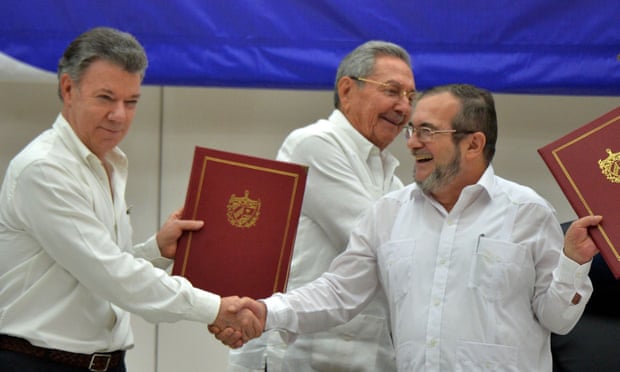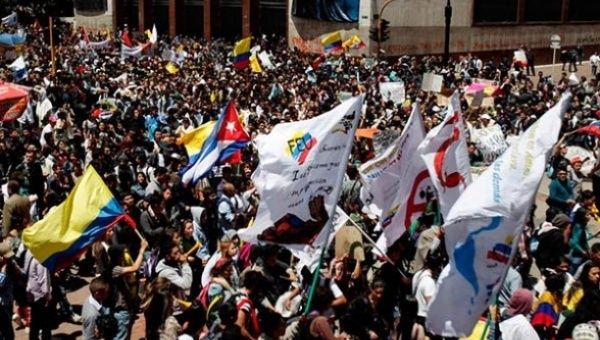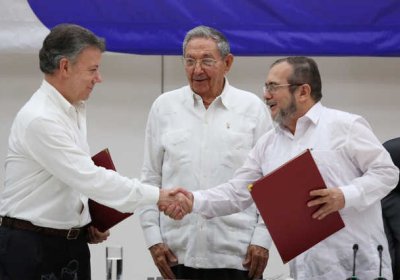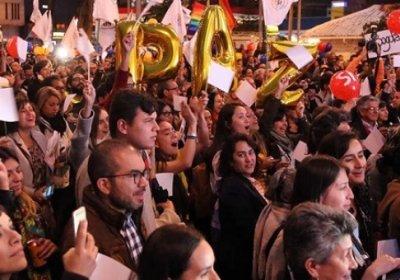 Photos of forcibly disappeared supporters of the Patriotic Union. Photo: EFE.
Colombian President Juan Manuel Santos acknowledged the state’s responsibility in the killing of thousands of members of a leftist political party three decades ago, TeleSUR English said on September 15. Santos pledged to prevent such assassinations again.
Photos of forcibly disappeared supporters of the Patriotic Union. Photo: EFE.
Colombian President Juan Manuel Santos acknowledged the state’s responsibility in the killing of thousands of members of a leftist political party three decades ago, TeleSUR English said on September 15. Santos pledged to prevent such assassinations again.
Revolutionary Armed Forces of Colombia (FARC)
 Photos of forcibly disappeared supporters of the Patriotic Union. Photo: EFE.
Colombian President Juan Manuel Santos acknowledged the state’s responsibility in the killing of thousands of members of a leftist political party three decades ago, TeleSUR English said on September 15. Santos pledged to prevent such assassinations again.
Photos of forcibly disappeared supporters of the Patriotic Union. Photo: EFE.
Colombian President Juan Manuel Santos acknowledged the state’s responsibility in the killing of thousands of members of a leftist political party three decades ago, TeleSUR English said on September 15. Santos pledged to prevent such assassinations again.
After the historic announcement on August 24 that negotiations have concluded in the Colombian peace process between the Colombian government and the left-wing Revolutionary Armed Forces of Colombia (FARC), here are the five key points that have been agreed on.
A groundbreaking peace deal has been signed between the government and left-wing Revolutionary Armed forces of Colombia (FARC) rebels. But while the more than 50-year-long war is finally over, difficult times still lay ahead to fully realise the promise of peace in the South American nation.
 Colombian President Juan Manuel Santos and FARC commander Timoleon Jimenez at a signing ceremony in Havana, Cuba for a historic ceasefire in June.
Colombian President Juan Manuel Santos and FARC commander Timoleon Jimenez at a signing ceremony in Havana, Cuba for a historic ceasefire in June.
 Rebels from the left-wing Revolutionary Armed Forces of Colombia (FARC).
One of the world's longest running conflicts appears to be nearing an end after more than 50 years of fighting. Colombian government officials and rebels from the left-wing Revolutionary Armed Forces of Colombia (FARC) gathered in Havana, Cuba, on June 23 to announce a historic ceasefire nearly four years in the making.
Rebels from the left-wing Revolutionary Armed Forces of Colombia (FARC).
One of the world's longest running conflicts appears to be nearing an end after more than 50 years of fighting. Colombian government officials and rebels from the left-wing Revolutionary Armed Forces of Colombia (FARC) gathered in Havana, Cuba, on June 23 to announce a historic ceasefire nearly four years in the making.
 Land reforms are essential to achieving a long-standing peace after half a century of conflict, said Colombian academic Alejandro Reyes on September 10 during a forum on agrarian issues in Bogota.
Land reforms are essential to achieving a long-standing peace after half a century of conflict, said Colombian academic Alejandro Reyes on September 10 during a forum on agrarian issues in Bogota.
The Revolutionary Armed Forces of Colombia (FARC) will continue its unilateral cease-fire, as long as the Colombian armed forces suspends all military operations against it, TeleSUR English said on April 20. FARC representatives made the commitment at peace talks in Havana with the Colombian state, which aim to end the decades-long civil war that has wracked the South American nation.
- Previous page
- Page 3



